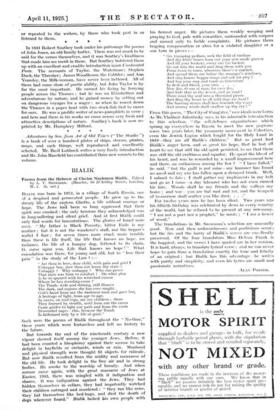}MALIK
B1ALIK was born in 1872, in a village of South Russia, one of a despised and persecuted people. He grew up to the dreary life of the eastern Ghetto, a life without courage or
hope. The Jews had been so long oppressed that their spirit was crushed : the only heroism they acknowledged was in long-suffering and silent grief. And at first Biaiik could only find words for lamentations. The. glories of Israel were over. " My father is Black Poverty, bitter Exile is my mother ; but it is not the wanderer's staff, nor the beggar's wallet I fear ; for seven times more cruel, more terrible than these is life itself, the life that knows no hope, no radiance, the life of a hungry dog, fettered to its chain.
0, curse upon. you, Life that knows no hope ! What consolation was there, for young and old, but to lose their pain " in the study of the Law ? :- " Art thou in love, dear child, with pain and grief f
Unhappy boy, dost thou not know thy state ? Unhappy ? Why unhappy ? Who can prove That man was born to comfort ? On what plea Is he to quarrel with his wretched corner Where he has standing-room ?
The Torah, wide and shining, still illtunes The dark, sad regions she has ever sought.
God's hand from out the darkness took and gave her, A heritage of light., from age to age.
In caves, on roof-tops, sat our children ; there They learned by stealth, until from out the caves Came guides to light our path and from the roofs Descended sages—this, because the Torah Is fathomed only by a life of grief."
Such were the poems of Bialik throughout the " No-time," those years which were featureless and left no history to the future.
But towards the end of the nineteenth century a new vigour showed itself among the younger Jews. Before, it had- been counted a blasphemy against their sorrow to 'take delight in hayfields or orchards, winds or rain. Manhood and physical strength were thought fit objects for ridicule.
But now Bialik revolted from the aridity and meanness of the old life. He took delight in the free air and in strong bodies. He awoke to the worship of beauty. And when sorrow came again, with the great massacre *of Jews at Easter, 1903, there was mingled with it indignation and shame. It was indignation against the Jews. They had hidden themselves in cellars, they had impotently watched their children outraged and murdered : " they ran like mice, they hid themselves like bed-bugs, and died the death of dogs wherever found." Bialik lashed his own people with his fiercest anger. He pictures them weakly weeping and praying to God, pale with cowardice, surrounded with corpses and moved only to feeble complaints. He pictures them begging compensation or alms for a violated daughter or a son torn in pieces :-
" Go, tramping pedlars, seek the field of victims
And dig white bones from out your new-made graves And fill your baskets, every one his basket. Go out into the world and drag them with you From town to town, wherever there's a market, And spread them out before the stranger's windows, And sing hoarse beggar-songs and ask for pity ! And beg your way and trade as heretofore In flesh and blood, your own . . .
Now floe, 0 son of man, for over flee, And hide thee in the desert, and go mad !
There rend thy soul into a thousand pieces And fling thy heart to all wild dogs for food ! The burning stones shall hiss beneath thy toaro And stormy winds shall swallow up thy cry ! "
From this poem, " The City of S!augliter," new ideals were born.
As Mr. Vladimir Jabotinsky says, in his admirable introduction to this selection, " the self-defence organizations which sprang up everywhere in Russia to meet the new pogrom- wave two years later, the yeomanry movexcnt in Palestine, even the Jewish Legion which fought for the Holy Land in 1918—they are all Bialik's children." But so great had Bialik's anger been, and so great his hope, that he lost all heart to see that still the old spirit persisted, to see that there was still the old craftiness and squalor. lie spent the blood of his heart, and was he rewarded by a small improvement here and there, an enthusiasm among the few ? " I have failed," he said, " but the guilt is not mine—my hammer has found no anvil and my axe has fallen upon a decayed trunk: Well, I submit to fate ; I shall gather my implements in my belt and go as I came—a day labourer who has not even* 'earned his hire. Woods shall be my friends and the valleys my home ; and 'YOU— you are but rust and rot, and the tempest of to-morrow shall scatter you like dust For twelve years now he haS been silent. Two years ago his fiftieth birthday was celebrated by Jews in every country of the world, but he refused to be present at any ceremony. " I am not a poet nor a prophet," he wrote ; " I am a hewer of wood."
The translations in Mr. Snowman's selection are unusually good. Now and then awkwardnesses and poeticisms occur ; but the fire and the hurry of Bialik's verses are excellently preserved. Of the four translators Miss Helena Frank is the happiest, and the verses I have quoted are in her version. It is hard, always, to translate lyrical verse ; and we can never hope to gain from a translation exactly the tone and felicity of an original ; but Bialik has this advantage—lie writes with purity and simplicity, and even his lyrics are small and passionate narratives.
ALAN PORTER.










































 Previous page
Previous page